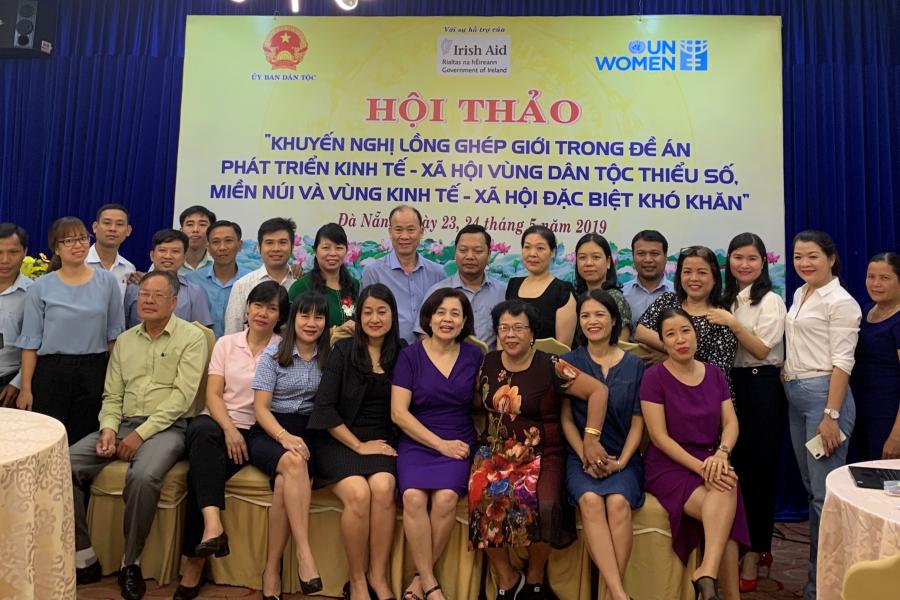Policy recommendations to promote gender equality in the Socio-Economic Development Plan in Ethnic Minority and Mountainous Areas for the 2021-2025 period with vision to 2030
23 May 2019
- Da Nang, May 23, 2019 – Today, in Da Nang, the Committee on Ethnic Minority Affairs (CEMA) and the United Nations Entity for Gender Equality and the Empowerment of Women (UN Women) Viet Nam held the workshop on Mainstreaming Gender in Socio-economic development Plan in ethnic minority and mountainous areas, and geographical areas with extremely difficult socio-economic conditions for the 2021-2025 period with vision to 2030. This workshop, organized with the financial support of Irish Aid in Viet Nam, received the participation of 30 delegates from 8 provinces and cities nationwide representing Ethnic Minority Committees at the provincial and district levels.

Based on the 2015 National Survey on the Socio-Economic Situation of the 53 Ethnic Minority Groups in Viet Nam conducted by the General Statistics Office and recent studies, findings show that gender issues in minority areas are more severe in ethnic minority groups than in the majority Kinh ethnic group, especially that in education and training, employment and income, health care and reproductive health. Maternal mortality rates in some ethnic minority groups are four times higher than that of Kinh women. In ethnic minority communities, women and girls are generally more disadvantaged in terms of access to opportunities and resources due to social norms which tend to position women as inferior to men, hence restrict their options and livelihoods activities as well as limit them to domestic and reproductive duties.
At the conference, Ms. Nguyen Thi Tu, Director of Ethnic Minority Department, CEMA addressed, "The intersectionality of discrimination based on both gender and ethnicity bears the most significant impact, resulting in inequalities faced by ethnic minority women and girls. It also affects their ability to access, participate and benefit from socio-economic development policies in ethnic minority and mountainous areas, and geographical areas with extremely difficult socio-economic conditions. Gender inequality prevents women and girls from reaching their full potentials and causes serious socio-economic losses. Hence, gender equality is an inseparable strategy in the process of developing and implementing a socio-economic development plan in ethnic minority areas".
Ms. Vu Phuong Ly, Programme Specialist of UN Women Viet Nam, emphasized that "In the context of Viet Nam's commitment to the Sustainable Development Goals (SDGs) and the pledge to "leave no one behind", gender inequality issues in ethnic minority areas must not only be considered in the policy making process but also must include a strong mechanism to monitor the investment of resources to advance gender equality. So far, the financial resources used to address gender inequality issues in general, especially in ethnic minority areas, are still very limited, which greatly hinders the implementation of plans and programs to advance women and girls in ethnic minority groups."
With highly engaged participants during the two-day workshop, all policy recommendations on promoting gender equality will be presented to the drafting team of the Master Plan for Socio-Economic Development for ethnic minority and mountainous areas, and geographical areas with extremely difficult socio-economic conditions for the 2021-2015 period with vision to 2030.




